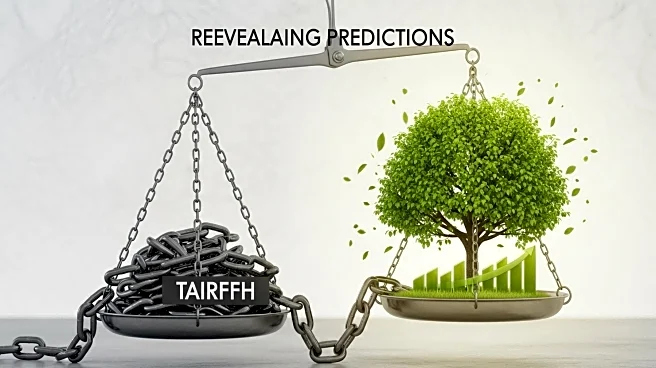What is the story about?
What's Happening?
Economists and financial experts initially predicted severe economic consequences following President Trump's imposition of significant tariffs on imports in April. These forecasts included expectations of stagflation, supply chain disruptions, and a potential deep recession. Notable figures such as Nobel Prize winner Paul Krugman and economists from Goldman Sachs anticipated a major economic downturn. However, contrary to these predictions, the U.S. economy has shown resilience, with growth nearing 4%, inflation remaining under 3%, and strong employment figures. The tariffs have generated substantial tax revenue, prompting discussions within the Trump administration about potential taxpayer bonuses. Despite some price increases in specific sectors, the feared recession has not materialized, leading to a reassessment of the initial economic forecasts.
Why It's Important?
The unexpected economic stability following the tariffs challenges the credibility of mainstream economic predictions and highlights the adaptability of the U.S. market. This development suggests that the U.S. may have been receiving unfavorable trade terms, as foreign exporters are absorbing the tariffs without passing significant costs onto American consumers. The additional tax revenue from tariffs, estimated at $400 billion annually, could bolster public finances and potentially support domestic manufacturing and job creation. This situation underscores the need for economists to critically evaluate their forecasting models and consider the dynamic nature of global trade and market responses.
What's Next?
Economists and policymakers may need to reassess their approaches to trade policy and economic forecasting, considering the unexpected outcomes of the tariffs. The Trump administration might explore further tariff adjustments or incentives to capitalize on the current economic conditions. Businesses and investors will likely continue to monitor the situation closely, adapting their strategies to align with the evolving trade landscape. The broader implications for international trade relations and domestic economic policy could lead to significant shifts in how the U.S. engages with global markets.
Beyond the Headlines
The divergence between predicted and actual economic outcomes raises questions about the influence of political biases on economic analysis. The situation parallels other instances where establishment forecasts have failed, such as Brexit. This highlights the importance of maintaining objectivity in economic assessments and the potential consequences of politicization in social sciences. The tariffs' impact on foreign exporters also suggests a reevaluation of global trade dynamics, potentially leading to more balanced trade agreements in the future.















